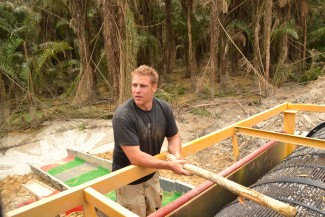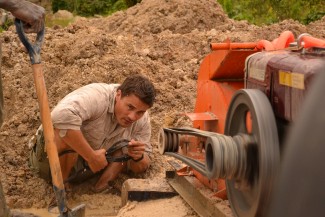INTERVIEW: ‘Jungle Gold’ returns to the golden opportunities of Ghana

In Jungle Gold, Discovery Channel’s hit reality series, George Wright and Scott Lomu try their best to climb out of a mountain of debt. Their loyal families wait at home while the two toil away in Ghana, hoping to strike gold and solidify their financial futures. The series, which airs Sundays at 10 p.m., follows their continued efforts to overcome the many obstacles of being adventurous entrepreneurs in a foreign land.
“We just tell people to expect the unexpected,” Wright said recently on a phone interview. “We thought we’d seen everything in Africa. This time around we saw things that we’ve never seen and experienced things we never experienced before, for good and bad.”
Lomu said he and his best friend are not “typical miners.” The two essentially decided to take a right turn from their professional lives roughly three-and-a-half years ago. Thanks to a series of occurrences, the Utah natives found themselves with this mining opportunity in Ghana. Ever since, it has been everything but easy.
“We’re not the type of guys who have been swinging a pick ax our entire lives,” Lomu said. “This is something that we kind of did out of necessity. And you know the problems in Africa gold mining, they just don’t go away. And you know we don’t get their gold mining overnight. This is definitely a process. And this next round that we had in Ghana, it’s presented just as many, if not more, problems than our first go-around.”
Lomu said they are finding success and constantly learning from their surroundings. The location for season two of the series is a spot with “more gold than any spot we’ve ever seen,” Lomu said, adding that they’re definitely on the right track. However, mining is a double-edged sword: More gold means more drama. “But that’s just kind of what you get out there in Africa,” Lomu said.
It’s obvious from watching the series and talking with the two best friends that one of the toughest challenges for these Americans is being away from their families back in the States. “I suppose that’s the one thing that we’ll never get used to and that’s the one thing that always remains hard,” Wright said. “We’re out there for a reason, and the reason has not changed. We’re still making sure we’re efforting to put debts to bed and to take care of our families. And being away from them is the one downside of being so far away because that doesn’t get any easier. The good news is our wives are still the strongest of all of us and so supportive, so loving, so concerned. And they stand by our side, you know, every step of the way.”

Both men have small children, and that can be a difficult reality. Lomu said they probably spend 50 percent of their time home and 50 percent of their time in Ghana.
Viewers of Jungle Gold know that Lomu and Wright have been met with severe hardships, so much so that Lomu admitted they’re “pretty much in the same predicament we were in before we started this.” But he was quick to point out that they’re making strides and achieving significant progress. “We are as just as bad off today as we were, you know, when this thing started,” Lomu said. “We have had, you know, successes out there in Ghana, but we’ve got a long way to go.”
Wright said it’s difficult for viewers to see how trying it can be for outsiders to acclimate to a different culture. Ever since arriving in Ghana on May 18, 2010, the men have had to “bend” to the will of the country, learning a different set of rules and customs.
“It’s been our biggest hope to show as much respect to the people that have allowed us into their country by … learning the language,” Wright said. “That’s one of the big things that shows a lot of respect. You know, everyone in Ghana speaks English, but their native language is called Twi. … And it’s the unifying language there, and so we try to learn the language and try to show respect, and it helps.”
Lomu said that although the TV show may highlight some frictions with people in Ghana, the reality is that they’ve been welcomed into the country. “Of course, no matter what country you’re in, they’ll always be some people unhappy that you’re there,” Lomu said. “But we were always welcomed in Ghana with open arms. I mean these are great people who don’t have the resources and the tools available to them to harvest the natural resources of their country. So when we show up, we split. We have a percentage of the gold that goes to the community. We pay all the workers. So when we show up, we employ a lot of people. So we are very, and always have been, very welcomed in Ghana. Because they know the resources they are sitting on. They just don’t have the ability, you know, to get it out of the ground.”
The perception of being foreigners in Ghana and taking the gold from the local community may be attributed to illegal miners. Because of the prevalence of illegal miners, Lomu said that sometimes there is “hesitance.” But he said their operations are legal and properly permitted. “When they see a couple of Americans come in and respect their way of life, it’s endearing,” Lomu said. “And it puts us in a good position with the Ghanaian people.”
Because of the constant work needed in the mining operations, there has been no time for enjoying the abundant nature of Ghana. Wright said there’s a nearby area with elephants and hippopotamus, but neither he nor Lomu has visited. Also nearby is a park with a ropes course through the canopy. They’ve never experienced that one either.
“When we are there, we are doing our absolute best to make sure that we can get to our families and have money to provide,” Wright said. “I suppose the enjoyed moments that Scott and I have are maybe 30 minutes or an hour at night before we go to bed where we kind of plan out what we’re going to be doing the next day, and how we can be doing better, and kind of a little inventory between him and I. … It’s just like being around with your best friend the whole time. And that’s the really good thing is however hard it gets, I can always look over and Scott’s there, and it’s just as hard for him, but we’re doing it together, and we got each other’s backs.”
There’s one activity the two men don’t exactly enjoy: watching their own show.
“I think if we were actors and we were putting on a great performance, I think it would be something that both Scott and I would be very proud of,” Wright said. “However, it’s quite the opposite. The troubles that we have out there, I mean they don’t even show one-tenth of the stuff that we go through. … And we watch as much as we possibly can while trying not to watch as much as we possibly can because it is very hard, and it builds anxiety. I turn it on, and if I see it on, I get anxious and stressed out and remember that, you know, there are still a lot of real problems that need to be solved.”
The future is still unwritten for the two adventurers. Right now they’re focused on Ghana, but Lomu said adaptability to different opportunities is key.
“Wherever we feel the best opportunity is, that’s where we’ll go,” Lomu said. “For now, we’ve dedicated so much time and effort in Africa. We’ve made so many connections and a lot of good friends that for us right now Africa is the answer. But that could all change. We’re not tied or stuck to any country in particular or any region. It’s just wherever the gold is and whatever makes sense. That’s where we’ll go.”
By John Soltes / Publisher / John@HollywoodSoapbox.com
-
Click here for more information on Jungle Gold.

